Trinidad Without The Mountains
George Victory “Key West is like “Trinidad without the mountains”
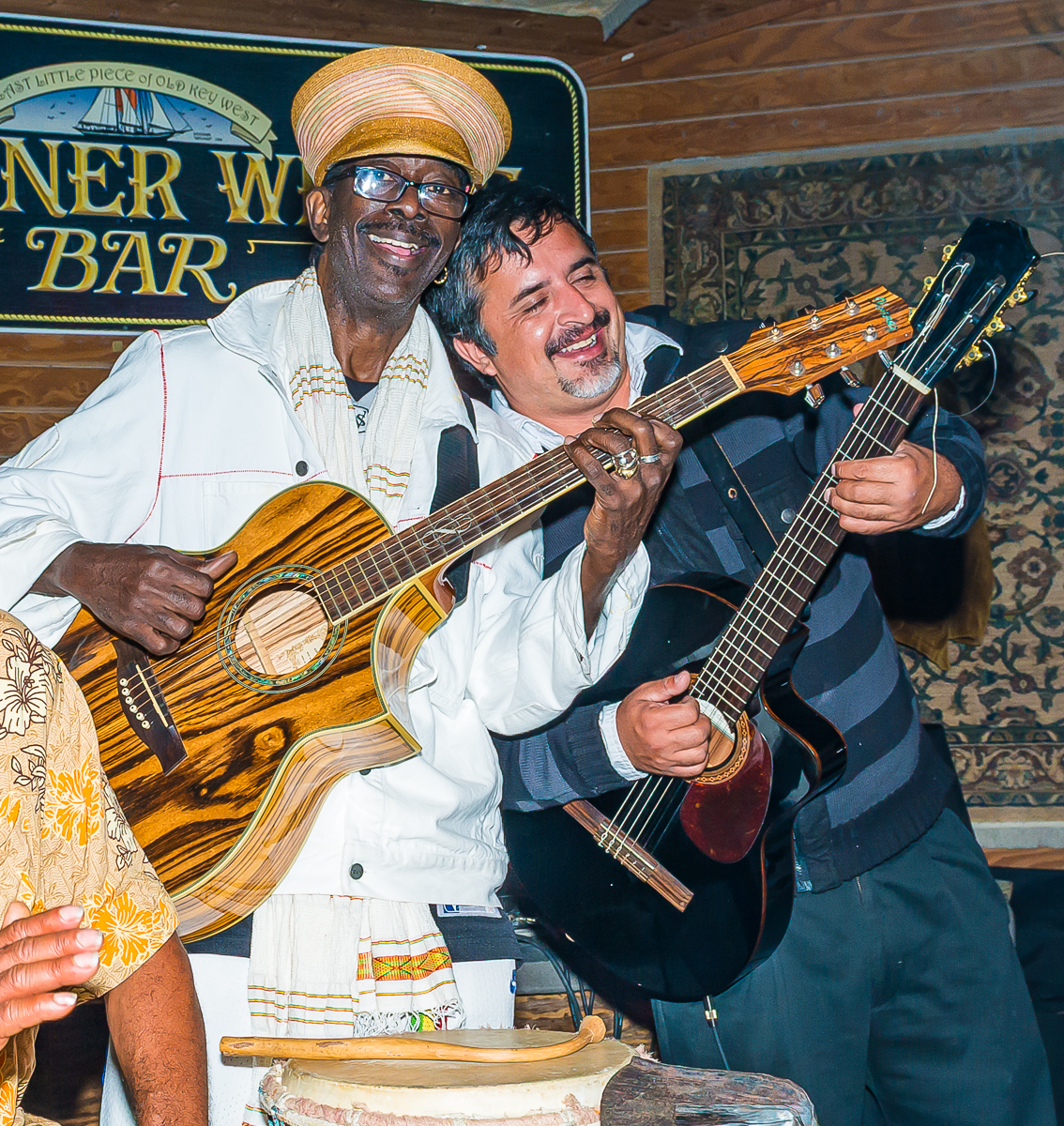
George Victory and Rolando Rojas “two of the three “Guitar Buddies” that would look for excuses to get together and play music.
George Victory was born February 7, 1950 and grew up in Five Rivers, a small village in the Arouca area of Trinidad. There was only one river but it curved around so much through this that you had to cross it five times. George’s mother sang in the church choir. George said if you closed your eyes and heard his father sing, you would have thought you were listening to Al Green. When he was 5 years old, George also started singing in the choir.
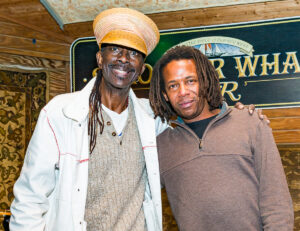
George Victory and Yvan Agbo (the third Guitar Buddy).
In 1959, friend Victor Lynch took several photos of nine-year-old George Victory singing and playing a guitar. He sent the photos to a friend who worked at the local newspaper. George was invited to perform in a Sunday evening competition. He performed an Elvis Presley’s song, “Return to Sender” and won the competition. His photos were all over the local papers with the title “a young Elvis Presley”.
George’s father and uncles surprised him with his first guitar. He was allowed to practice after he had fed all the animals on their small farm. He quickly taught himself to play a Louie Armstrong tune, “That Ole Black Magic”.
His father was impressed and encouraged George to learn five new songs, by Andy Williams and Nat King Cole, all in one day. He practiced very hard and learned the new music. When his father came home from work that day, George was waiting for him smiling. His father knew why he was smiling and said “back me up” and he started singing “Sentimental Reasons”. George started to play his guitar and began adding a few chords. His father stopped him, saying “you have to understand the basic chord, not just play them”. He told George to “feel them corazon”. His father spoke a little Spanish and meant “feel them in your heart”.
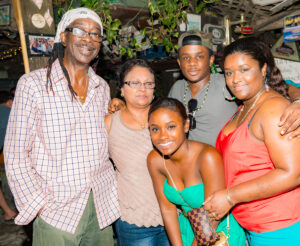
George, wife Claudette, and part of the family including young Ceegee (combo of their first intials Claudette & George).
His father went on to say there are notes in a basic chord that you had to feel as you run your fingers over the strings. George played the chords over and over and would use the bass string on the side. He credits his father for giving him this great insight that he continued to use throughout his career.
George ended up in a military school trying to learn welding. He remembers the bugle horn blowing early in the morning. The discipline was good but music was George’s first calling, and he quickly moved on to performing.
After a successful audition, George’s first musical touring began with the Mighty Sparrow in Trinidad. He would soon travel all over the world between 1968-1977. He also played with Jimmy Cliff during this same period. In the mid 70s, he began playing with another Trinidad musician/saxophonist Roy Cape All Stars. They opened for Ike and Tina Turner in Madison Square Garden.
Victory opened for the Commodores 1980 North American Tour, then the Spinners, Gladys Night and the Pips, and Aretha Franklin. While touring, he avoided any of the pitfalls of touring like drugs. The death of a good friend Fred Demery from drugs had hit very hard
In 1995, George got a call from a Daytona Beach friend asking George to sit in on guitar for a few weeks. George gave up some very lucrative commercial work in New York and played Spring Break on the beach. They did not want him to leave and made him a very good offer. George stayed and ended up buying a house in Daytona Beach.
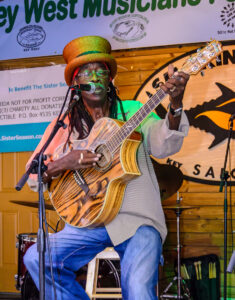 In 2001, George was called by another friend in Key West whose guitarist was sick.
In 2001, George was called by another friend in Key West whose guitarist was sick. 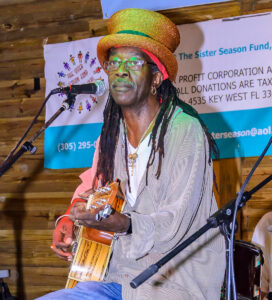 After two weeks of playing in what is now Dante’s, the manager also made George a very good offer and by then George had fell in love with Key West. He frequently traveled to Daytona, New York, and occasionally Tampa to perform.
After two weeks of playing in what is now Dante’s, the manager also made George a very good offer and by then George had fell in love with Key West. He frequently traveled to Daytona, New York, and occasionally Tampa to perform.
George once told me that Key West was like “Trinidad without the mountains”. He loved the small island community with less hustle and bustle. He formed a small local group, The Observant Lion, and played regularly. As he had matured over the years, George still loved rock and roll, soul, calypso, and other genres but developed an understanding and a pronounced appreciation for the “warmth” of the Blues.
Once while performing at the Key West Musicians Festival George said it was like a “Rising Woodstock.” More musicians are coming into Key West and George says they bring different attributes and musical phrasing and contribute to the local tapestry. George and the Key West Soul Man Robert Albury would perform together almost every week. Their vocals were epic. George would especially look forward to playing music for almost any reason with his “guitar buddies” the late Yvan Agbo, and Rolando Rojas.
George’s favorite gig for over a decade was playing for King Rashaad of Morocco for New Years, and Birthday Parties. The king would fly him to Morocco and he would perform in the palace, not a bad gig.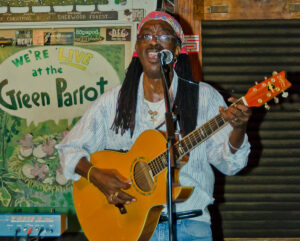
George Victory lost a long battle with heart disease in July 2016. A celebration of his life was held at Schooner Wharf Bar in October 2016 attended by many of his friends. He is survived by his wife, Claudette, four children: Gregory, Kerensha, Cegee, and Hussain, and 12 grandchildren. His daughter Cegee is a clarinet player with a great voice and tours with the Wailers.
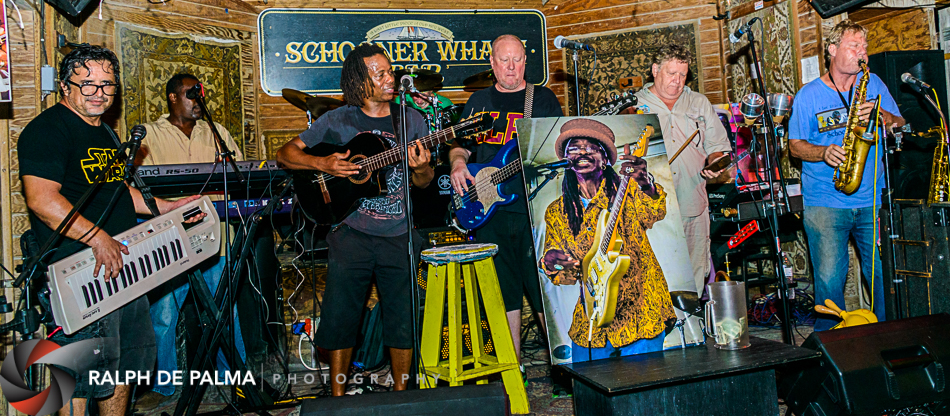
A Celebration of Life for George Victory was held at Schooner Wharf Bar in October 2016, over 20 Key West musicians performed in his honor. George was a beloved friend to all.
There are no comments yet, add one below.



Leave a Reply